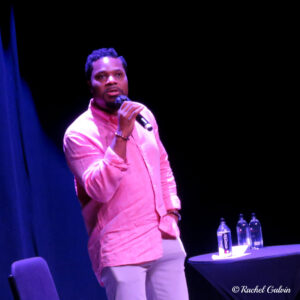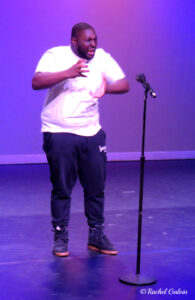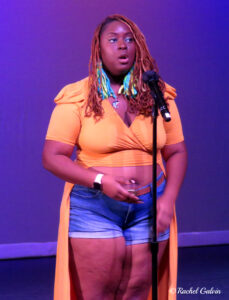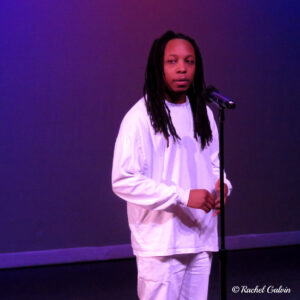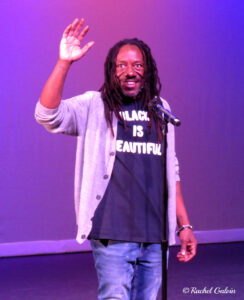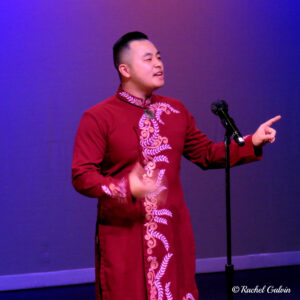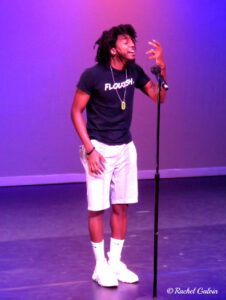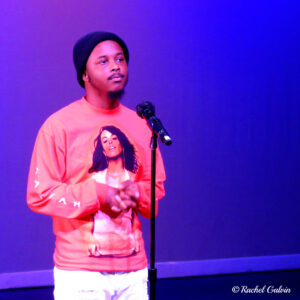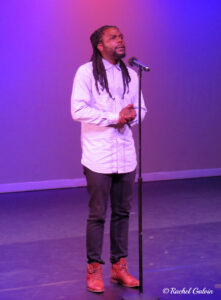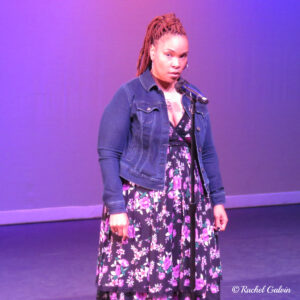Pompano Beach welcomed poets from around the country Dec. 9 to 11 for the 4th annual Exit 36 Slam Poetry Festival. The three-day event was held at several locations – Ali Cultural Arts Center, Blanche Ely House Museum and Pompano Beach Cultural Center. After showing their stuff, a winner was decided.
The overall winner was Black Chakra, who received $2500. Second place was Lady Brion, who won $1500. Third place was Blacqwildflowr, who won $1000.
“We had 14 poets,” said Eccentrich Richardson, the event’s founder, saying normally there are 15 people but one dropped out. They put out a call and people responded from all over. “We had people come from as far west as Los Angeles, as far east as Baltimore and everything in between– Detroit, Tampa…” she said.
Poets included Ali, Jonkel, Wayne Henry. Native Child, Mori Taiye, Black Chakra, Lady Brion, Ephraim Nehemiah, Charles Hines, Masaki Takahashi, Jahman Hill, Sun Luu, Genius Jones and Blacqwildflowr.
The participants, said Richardson, always participate in community outreach while they are here, selecting which event to participate in. They led workshops this year for young people up to seniors at places like Moreland Academy, Hopewell Preschool Academy, Palm Beach Middle School and E. Pat Larkins Community Center.
Last year was done virtually, so she said it was nice to do it in person.
“This year, the focus is on being together again,” she said.
She added, “There are typically five judges each night. They give scores for each poet. We drop the high and low and average the three in the middle.”
What was exciting about this year’s competition is that they had actor Malcolm Jamal Warner as one of the judges. Warner is best known as playing Theo in “The Cosby Show.”
On Friday, December 10 at Pompano Cultural Center, Warner gave a talk about his life and even did some poetry. Warner, who started working as an actor a young boy, is now working on the TV show “The Resident,” which shoots in Atlanta, says he misses life in Los Angeles.
Warner was unsure where to begin with his talk. “One of the most nerve-wracking things for an actor is to get up in front of people and talk,” he explained (since actors are normally given lines). So, he started with reciting his own poetry but then managed to deliver an interesting and heartfelt discussion about his career.
“My father named me after Malcolm X and (Jazz pianist) Ahmad Jamal. My dad went to Lincoln University because Langston Hughes went. Poetry has always been a huge part of my life since I was a baby. I am not an actor who likes to do poetry. I am a poet. I have been doing it half my life. I started out in the early ’90s before slams. When slams came along, I noticed how they started changing how they were writing. They were writing for the judges. There was a certain honesty that got shifted because they were writing for competition,” he said, adding, “When it comes to judging, if it doesn’t appeal to me, it doesn’t mean it’s not good … I look for honesty in the writing.”
“As poets, [we] have a wonderful access to words,” he said. “I see creating as this river that flows underneath all of us [but] not all of us have the tools to access it. I take it as a blessing and honor to be able to tap into that creativity.”
He continued, “As I look at my life and things that have been ‘put out into the universe,’ [the good and the bad, I say,] ‘I created that because of what I put into the universe.’”
He added, “A lot of times, we can be really hard on ourselves [and say things to ourselves] that we wouldn’t take from another human being.” He basically said that in order to not do that, it comes down to a “sense of constant mindfulness.”
“I’ve always written poetry, even at the height of Cosby. It has always been an avenue of expression for me. It was most important to me when doing ‘Malcolm and Eddie.’ I had done eight years with Cosby. I came from a show where black people could be funny without being stereotypical. I watched how Cosby struggled. Cosby said it wasn’t [about a black upper middle class family but about ] an upper middle class family who happens to be black. He had to fight to keep the integrity of the show. UPN was the antithesis of where I came from. I was literally fighting every day because UPN had its own audience and programming. As far as they were concerned, it wasn’t broken and did not have to fix it. It became almost miserable for me,” said Warner, adding, “My experience probably was a little skewed.”
“There are three main things you are going to see on black sitcoms,” said Warner, “– some version of ‘you so ugly,’ ‘I’m going to kick your butt’ or someone slapped in the back of the head. That’s what we except as the norm. But, there is another kind of way black people can also be funny.”
He said he used to watch sitcoms like “The Jeffersons” and “Sanford and Son,” but his favorite was “Benson” because he was “always the smartest person in the room,” speculating that maybe he should redo the sitcom.
“The ‘Malcolm and Eddie’ show was so stressful,” he said, saying he was the only person who cared it seemed. It was then when he started playing bass, thinking he needed a hobby that would not turn into a career, but it did. He now has a Jazz funk spoken word band — combining his love of words with his love of music. It is called “Miles Long.”
“I found a home in poetry … and music. It allowed me to express myself as an actor and director. So many people direct and act. I found an outlet. I could be as passionate and honest as I wanted to be … The level of expression and freedom to be creative is what’s priceless for me,” he said.
What has been his biggest accomplishment? “I look at having been a teenager on the No. 1 show in the world. South Africa was neck deep in apartheid and it was the No. 1 show [there too]. Then, being able to navigate everything that comes with the territory (being a child star). I was 14 when it first aired.”
“Out of the gate,” he added, “No one was going to watch the show. They pronounced it dead. It was third against ‘Magnum PI,’ which was No.1. But, out-of-the-box, [it went] crazy [popular]. My mom sat me down and said [although it is a wonderful phenomenon], it could stop next year.”
With her help, he realized if he did not want to go back to bagging groceries, he had to come up with a plan for how his life would be after Cosby. “We lived each year as if it was the last show. She impressed upon me longevity.” Sometimes, an actor can be hot, sometimes not. If what’s you want have to figure out, he said – what to do when not making money so you can avoid desperate career choices. “That is why I directed early on, directed episodes of “Cosby,” “Fresh Prince,” did music videos…”
He also said that “The Cosby Show” being shot in Brooklyn, New York, not in LA studios, helped him remain more grounded. Instead of eating in the commissary, they had to go out in the neighborhood and get lunch. “The experience gave us a real perspective, not the bubble of LA,” he said.
“The show was successful,” he said, “It doesn’t mean I’m successful. It doens’t mean anything unless I’m working at 30, only when I am working consistently at 50, 60… At 51, I can embrace that I have had a successful career. I now can look in the mirror and like myself. I am at peace in my life. I have a wonderful wife, daughter. [My greatest accomplishment] is that I have gone through all that and have created such a beautiful life for myself.”
He had to make some tough choices along the way, but stuck with keeping his integrity. “I felt I would be working so much more If had not said no [so much]. I never wanted to look back and be embarrassed by [a project.]” He did not want to be in something that perpetuated b stereotypes. “I used to be judgmental of others who would take that kind of work,” but he later realized he had the privilege to be able to say no because of his position, they did not. They needed the income, etc.
“Cosby used to say, ‘Remember this is a marathon. In the journey there’s going to be obstacles,’” he said, explaining how he not only is working full-time but working on staying present as a husband and father. In addition, he said that being a public figure is a 24 hour, seven day a week job that comes with the territory. He does not take that responsibility lightly either, saying when he meets people, “He wants to create an experience.”
He certainly did create an experience at Exit 36, one that the people in attendance surely will never forget.
For more information on upcoming artistic events in Pompano, visit www.pompanobeacharts.org.


